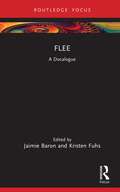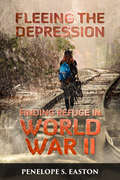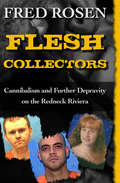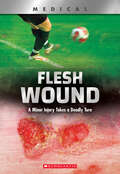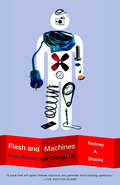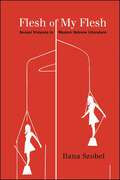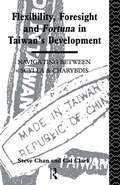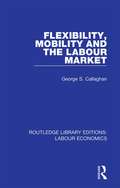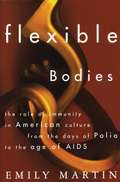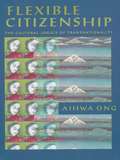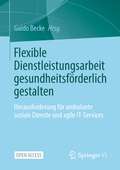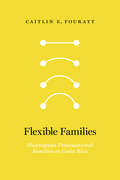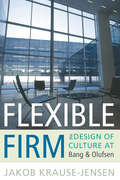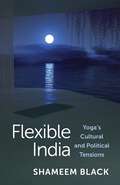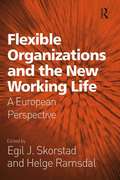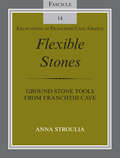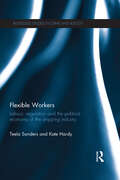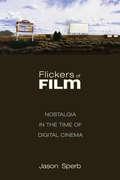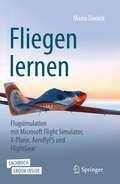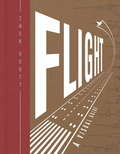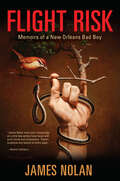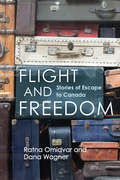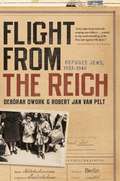- Table View
- List View
Flee: A Docalogue (Docalogue)
by Jaimie Baron Kristen FuhsThis sixth volume in the Docalogue series explores the significance of Flee, the award-winning and critically acclaimed 2021 animated documentary about one man's journey from child refugee in Afghanistan to building a stable home as an adult with his soon-to-be husband in Denmark.The film is particularly notable in that it asks pressing questions about how stories of marginalized peoples come to be told, circulated, and consumed within contemporary culture. By combining five distinct perspectives on a single documentary, this book models different critical approaches to the same cinematic object, acting both as an intensive scholarly treatment of a film and as a pedagogical guide for how one might analyze, theorize, and contextualize a film. Through multiple voices, this book seeks to generate a complex and cumulative discourse about Flee’s significance in multiple areas including but not limited to: its position within the traditions of contemporary European cinema and animated documentary, its role within the broader category of migrant media, exploring how cross-cultural audiences make sense of refugee narratives, examining important epistemological and ethical questions about what is and what is not shown in the documentary, and how film is situated within the contemporary documentary industry, with its reliance on the promotional efforts of celebrity personalities.This book will be of interest to students and scholars of documentary studies, animation, migration theory, celebrity studies, queer theory, and global cinema.
Fleeing Castro: Operation Pedro Pan and the Cuban Children's Program
by Victor Andres Triay"The first complete and comprehensive work on these important, unique programs. . . . An interesting, humane, yet tragic component of the post-1959 Cuban experience and the Cold War in general."--Antonio Benitez-Rojo, Amherst College "The ordeal began [for the children] when their parents told them they had to travel alone and that they had to keep the upcoming trip a secret. The most powerful parts of the book are their accounts. . . . Through interviews with many of the participants—the children and their parents, the coordinators of the airlift, those in the underground in Cuba and the Catholic sponsors in the United States—Triay attempts to answer many of the questions the exodus raised."--Miami Herald A stirring account of the covert effort to smuggle Cuban children into the United States in the aftermath of Fidel Castro's rise to power, Fleeing Castro brings to light the humanitarian program designed to care for the children once they arrived and the hardship and suffering endured by the families who took part in Operation Pedro Pan. From late 1960 until the October 1962 missile crisis, 14,048 unaccompanied Cuban children left their homeland, the small island suddenly at the center of the Cold War struggle. Their parents, unable to obtain visas to leave Cuba, believed a short separation would be preferable to subjecting their offspring to Castro's totalitarian Marxist state. For the children, the exodus began a prolonged and tragic ordeal--some didn’t see their parents again for years; a few never did. Until now, this chapter of the Cuban Revolution has been relatively obscure. Initially the result of an effort by James Baker, headmaster of an American school in Cuba who worked closely with the anti-Castro underground, Pedro Pan quickly came to involve the Catholic Church in Miami and, in particular, Father Bryan Walsh, who established the Cuban Children's Program, the nationwide organization that cared for those children without relatives or friends in the United States--almost half of them. The latter program, in effect until 1981, was the first to allot federal money to private agencies for child care, an action with far-reaching repercussions for U.S. social policy. Victor Andres Triay traces this story from its political and social origins in Cuba, setting it in the context of the Cold War and describing the roles of the organizations involved in Cuba and in the United States. Making use of extensive interviews with Baker, Walsh, and influential underground figures, as well as personal letters that document the fears and dreams of both the parents and the children, Triay presents this history of Pedro Pan--the largest child refugee movement ever in the Western Hemisphere--with the drama of an international thriller and the pathos of a heartbreaking family drama.
Fleeing the Depression: Finding Refuge in World War II
by Penelope S. EastonFleeing the Depression: Finding Refuge in World War II chronicles the adventures of a small town girl defying 2Oth century rules to become a strong, independent woman. Growing up, Penelope heard the older women’s euphemisms about sex and mating. Never satisfied with empty explanations, she read her physician father’s anatomy books to learn the truth about female bodies. Later, as a dietetic intern at one of the Army’s biggest hospitals, she learned the language of combat soldiers and the horrors of war. Penelope’s curiosity, sense of humor, and fearlessness emboldened her as she traveled a man’s world and, through her actions and ways, helped pioneer the contours that define modern-day feminism.Through [Easton'] stories that foretold her future, we find a likable girl who survived and thrived in a world that was not always kind to her... Any women can identify with the stories that did not always provide the respect that women deserved in the 20th Century. -- Deborah Tippett, Ph.D. Professor, Human Environmental Sciences, Meredith College, Raleigh, NC
Flesh Collectors: Cannibalism and Further Depravity on the Redneck Riviera
by Fred RosenJeremiah Rodgers and Jonathan Lawrence met in Florida's hospital for the criminally insane. Released, they went back to Lawrence's hometown of Milton, Florida, where they soon murdered Justin Livingston, Lawrence's mentally challenged cousin. The horror peaked when they brutally raped and shot 18-year-old Jennifer Robinson and then decided to cannibalize her body.
Flesh Wound: A Minor Injury Takes a Deadly Turn (XBooks: Medical)
by Shea PhillipsWill they solve this medical mystery in time?When Bo Salisbury hurts his ankle playing soccer, doctors think it's a bad bruise. Soon his leg gets worse, and he feels very sick.High-interest topics, real stories, engaging design, and astonishing photos are the building blocks of the XBooks, a new series of books designed to engage and motivate reluctant and enthusiastic readers alike. How can a bite from a pet prairie dog cause a life-threatening illness? Where does the guinea worm, a parasite that lives under human skin, come from? How can a virus that attacks the brain be related to birds dropping dead at the zoo? With topics based in science, these action-packed books will help students unlock the power and pleasure of reading... and always ask for more!
Flesh and Machines: How Robots Will Change Us
by Rodney A. BrooksAre we really on the brink of having robots to mop our floors, do our dishes, mow our lawns, and clean our windows? And are researchers that close to creating robots that can think, feel, repair themselves, and even reproduce? Rodney A. Brooks, director of the MIT Artificial Intelligence Laboratory believes we are. In this lucid and accessible book, Brooks vividly depicts the history of robots and explores the ever-changing relationships between humans and their technological brethren, speculating on the growing role that robots will play in our existence. Knowing the moral battle likely to ensue, he posits a clear philosophical argument as to why we should not fear that change. What results is a fascinating book that offers a deeper understanding of who we are and how we can control what we will become.
Flesh of My Flesh: Sexual Violence in Modern Hebrew Literature (SUNY series in Contemporary Jewish Literature and Culture)
by Ilana SzobelFinalist for the 2021 Best Book in Israel Studies presented by the Azrieli Institute of Israel Studies and Concordia University LibraryFlesh of My Flesh looks at one of the most silenced and repressed aspects of Israeli culture by examining the trope of sexual violence in modern Hebrew literature. Ilana Szobel explores how sexual violence participates in, encourages, or resists concurrent ideologies in Jewish and Israeli culture, and situates the rhetoric of sexual aggression within the contexts of gender, ethnicity, disability, and national identity. Focusing on writings of incest survivors, Sepharadi authors, wounded soldiers, and Hebrew authors such as Shoshana Shababo, Gershon Shofman, Hayim Nahman Bialik, Yoram Kaniuk, Amalia Kahana-Carmon, and Tsvia Litevsky, Szobel unveils the various roles of sexual violence in destabilizing hegemonic notions or reinforcing norms and modes of conduct. Thus, while the book looks at poetic and social possibilities of action in relation to sexual violence, it also exposes the Gordian knot of sexualized gender-based violence and the interests of patriarchy, heteronormativity, nationalism, racism, and ableism.
Flexibility, Foresight and Fortuna in Taiwan's Development
by Steve Chan Cal ClarkUsing the developmental history of Taiwan as a starting point, Flexibility, Foresight and Fortuna critically examines several prevalent formulations of domestic development and international economy.The authors examine Taiwan's policy performance from, in turn, the developmental, the dependency, the statist, and the trade-off perspectives on political economy. They reject these approaches in favour of the key ideas of flexibility, foresight and fortuna as an explanation of Taiwan's relatively unusual success in achieving domestic development and upward mobility in the international system.
Flexibility, Mobility and the Labour Market (Routledge Library Editions: Labour Economics #6)
by George S. CallaghanFirst published in 1997. Politicians of all shades argue that the labour market should be more flexible and workers more mobile. But what does this mean in reality? How flexible and mobile are workers likely to be? Is there an ideological base to the language of flexibility? These are some of the issues covered in this book. Data from a large factory and office is used to argue that the macro labour market consists of non-competitive work groups where strongly held views and values represent a substantial barrier to simplistic definitions of flexibility and mobility. The analysis takes place in three chapters, dealing with recruitment for work, skills used in work and perceptions of different types of work and workers. The findings suggest that non-economic forces (such as institutional, social, historical and political phenomena) strongly influence the creation of separate work cultures. Furthermore, it is argued that the reason for differences between work groups being articulated in a defensive fashion reflects the climate of fear in the labour market, where flexibility is associated with a loss of the (often limited) power, control and influence workers have over their position in the labour market.
Flexible Bodies: Tracking Immunity in American Culture from the Days of Polio to the Age of AIDS
by Emily MartinEmily Martin traces Americans' changing ideas about health and immunity since the 1940s. She explores the implications of our emphasis on 'flexibility' in contexts from medicine to the corporate world, warning that we may be approaching a new form of social Darwinism.
Flexible Citizenship: The Cultural Logics of Transnationality
by Aihwa OngFew recent phenomena have proved as emblematic of our era, and as little understood, as globalization. Are nation-states being transformed by globalization into a single globalized economy? Do global cultural forces herald a postnational millennium? Tying ethnography to structural analysis, Flexible Citizenship explores such questions with a focus on the links between the cultural logics of human action and on economic and political processes within the Asia-Pacific, including the impact of these forces on women and family life.Explaining how intensified travel, communications, and mass media have created a transnational Chinese public, Aihwa Ong argues that previous studies have mistakenly viewed transnationality as necessarily detrimental to the nation-state and have ignored individual agency in the large-scale flow of people, images, and cultural forces across borders. She describes how political upheavals and global markets have induced Asian investors, in particular, to blend strategies of migration and of capital accumulation and how these transnational subjects have come to symbolize both the fluidity of capital and the tension between national and personal identities. Refuting claims about the end of the nation-state and about "the clash of civilizations," Ong presents a clear account of the cultural logics of globalization and an incisive contribution to the anthropology of Asia-Pacific modernity and its links to global social change.This pioneering investigation of transnational cultural forms will appeal to those in anthropology, globalization studies, postcolonial studies, history, Asian studies, Marxist theory, and cultural studies.
Flexible Dienstleistungsarbeit gesundheitsförderlich gestalten: Herausforderung für ambulante soziale Dienste und agile IT-Services
by Guido BeckeDies ist ein Open-Access-Buch.Im Zentrum des Bands steht die gesundheitsförderliche Gestaltung flexibler Dienstleistungsarbeit. Am Beispiel von technischen, d. h. agilen IT-Services und sozialen, d. h. ambulanten hauswirtschaftlichen Diensten werden Belastungskonstellationen und Gesundheitsressourcen von Beschäftigten im Umgang mit Flexibilitätsanforderungen analysiert. Zugleich werden betrieblich erprobte und evaluierte Interventionslösungen sowie Erfahrungen ihres regionalen Transfers diskutiert. Es zeigt sich, dass beide Beispielbereiche flexibler Dienstleistungsarbeit durch relativ hohe Anforderungen an die Interaktionsarbeit mit Kund*innen geprägt, aber in unterschiedliche Interaktionsordnungen eingebunden sind. Vorstellungen von einfacher hauswirtschaftlicher Dienstleistungsarbeit sind in Anbetracht komplexer Interaktionsanforderungen zu revidieren.
Flexible Families: Nicaraguan Transnational Families in Costa Rica
by Caitlin E. FourattFlexible Families examines the struggles among Nicaraguan migrants in Costa Rica (and their families back in Nicaragua) to maintain a sense of family across borders. The book is based on more than twenty-four months of ethnographic fieldwork in Costa Rica and Nicaragua (between 2009 and 2012) and more than ten years of engagement with Nicaraguan migrant communities. Author Caitlin Fouratt finds that migration and family intersect as sites for triaging inequality, economic crisis, and a lack of state-provided social services.The book situates transnational families in an analysis of the history of unstable family life in Nicaragua due to decades of war and economic crisis, rather than in the migration process itself, which is often blamed for family breakdown in public discourse. Fouratt argues that the kinds of family configurations often seen as problematic consequences of migration—specifically single mothers, absent fathers, and grandmother caregivers—represent flexible family configurations that have enabled Nicaraguan families to survive the chronic crises of the past decades. By examining the work that goes into forging and sustaining transnational kinship, the book argues for a rethinking of national belonging and discourses of solidarity.In parallel, the book critically examines conditions in Costa Rica, especially the ways the instabilities and inequalities that have haunted the rest of the region have begun to take shape there, resulting in perceptions of increased crime rates and a declining quality of life. By linking this crisis of Costa Rican exceptionalism to recent immigration reform, the book also builds on scholarship about the production and experiences of immigrant exclusion. Flexible Families offers insight into the impacts of increasingly restrictive immigration policies in the everyday lives of transnational families within the developing world.
Flexible Firm: The Design of Culture at Bang & Olufsen
by Jakob Krause-JensenBang & Olufsen, the famous Danish producer of high-end home electronics, is well known as an early exponent of value-based management: the idea that there should be consistency in what the organisation does, a certain continuity between what the company develops and sells, and the beliefs and practices of the employees. This study investigates how company values are communicated and the collective identity is articulated through the use of such concepts as 'culture', 'fundamental values', and 'corporate religion', as well as how employees negotiate these ideas in their daily working lives. As this book reveals, the identification of values, meant to create cohesion and solidarity among employees, came to symbolise and engender a split between the staff and the other parts of the company. By examining the rise and fall of the value-based management approach, this volume offers the indispensible insight of anthropological enquiry to expose how social realities challenge conventional management strategies and therefore must be considered in the development of new management techniques.
Flexible India: Yoga's Cultural and Political Tensions
by Shameem BlackYoga has offered the Indian state unprecedented opportunities for global, media-savvy political performance. Under Modi, it has promoted yoga tourism and staged mass yoga sessions, and Indian officials have proposed yoga as a national solution to a range of social problems, from reducing rape to curing cancer. But as yoga has gone global, its cultural meanings have spiraled far and wide. In Flexible India, Shameem Black travels into unexpected realms of popular culture in English from India, its diaspora, and the West to explore and critique yoga as an exercise in cultural power.Drawing on her own experience and her readings of political spectacles, yoga murder mysteries, court cases, art installations, and digital media, Black shows how yoga’s imaginative power supports diverse political and cultural ends. Although many cultural practices in today’s India exemplify “culture wars” between liberal and conservative agendas, Flexible India argues that visions of yoga offer a “culture peace” that conceals, without resolving, such tensions. This flexibility allows states, corporations, and individuals to think of themselves as welcoming and tolerant while still, in many cases, supporting practices that make minority populations increasingly vulnerable. However, as Black shows, yoga can also be imagined in ways that offer new tools for critiquing hierarchical structures of power and race, Hindu nationalism, cultural appropriation, and self-help capitalism.
Flexible Organizations and the New Working Life: A European Perspective
by Helge RamsdalWhat are we actually talking about when we talk of flexibility in organizational settings? Do flexible forms of organization lead to varied, challenging and autonomous work or do they have a negative impact on working conditions? These questions are confronted by a group of specialist authors including Stephen Ackroyd, Harriet Bradley, Jan Ch. Karlsson, Philippe Mossé and Michael Rose, who discuss the concept of flexibility in relation to employment practices, organizational structure, cultural peculiarities and network arrangements in France, Italy, Norway, Sweden and the UK. While the question of workplace flexibility has been much debated in recent years, the main issues discussed have been the practice of non-standard forms of employment such as part-time work. This book is distinctive in dealing with flexibility related to organizational arrangements, organizational culture and network arrangements, and in assessing the combined effects of different arrangements in terms of manpower, structure, culture and networks on flexibility.
Flexible Stones: Ground Stone Tools from Franchthi Cave, Fascicle 14, Excavations at Franchthi Cave, Greece (Excavations at Franchthi Cave, Greece)
by Anna StrouliaDespite their ubiquitous presence among prehistoric remains in Greece, ground stone tools have yet to attract the same kind of attention as have other categories of archaeological material, such as pottery or lithics. Flexible Stones provides a detailed analysis of the material discovered during the excavations at Franchthi Cave, Peloponnese, Greece. Approximately 500 tools, the raw material used for their manufacture, as well as the byproducts of such manufacture were found. Most of this collection comes from the Neolithic component of the site—including a small number of Palaeolithic and Mesolithic cases—with a large number of the studied tools indicating multiple uses. Anna Stroulia sees the multifunctional character of these tools as a conscious choice that reflects a flexible attitude of tool makers and users toward tools and raw materials. A CD-Rom with 209 additional plates is included.
Flexible Workers: Labour, Regulation and the Political Economy of the Stripping Industry (Routledge Studies in Crime and Society)
by Kate Hardy Teela SandersStriptease and other types of erotic dance increasingly make up a large, lucrative and visible part of the sex industries in the United Kingdom and 'lap dancing' has become the focus of many important contemporary debates about gender, work and sexuality. This new book from Teela Sanders and Kate Hardy moves away from the more traditional focus on the relations between dancers and customers, to a focus on regulation and the working conditions experienced by those working in stripping work. Drawing on interviews, survey data and participant observation with dancers, managers, regulators and other staff, Sanders and Hardy present the first ever nationwide study of the stripping industry and the working lives of those within it. The book explores the reasons for the expansion of the industry in the United Kingdom and the experiences, opinions and perspectives of those that produce and shape it. Placing dancers' voices centre stage, it examines the wider political economy which shapes dancers' engagement in employment in the stripping industry, pointing towards the wider conditions of the labour market and growing privatisation of Higher Education as explanatory factors for its labour supply. In suggesting a new feminist politics of stripping, dancers voice their own political awareness of erotic dance and an intersectional analysis of solidarity with workers in the stripping industry is foregrounded. Presenting a 360 degree view of the industry, this ground-breaking study presents systematic evidence for the first time on this area of social life which has become central as a strategy of survival, class mobility and urban accumulation. It will appeal to undergraduate and postgraduate students across the fields of criminology, sociology, geography, labour studies and gender studies, as well as regulators, activists and even dancers themselves.
Flickers of Film
by Jason SperbWhether paying tribute to silent films in Hugo and The Artist or celebrating arcade games in Tron: Legacy and Wreck-It-Ralph, Hollywood suddenly seems to be experiencing a wave of intense nostalgia for outmoded technologies. To what extent is that a sincere lament for modes of artistic production that have nearly vanished in an all-digital era? And to what extent is it simply a cynical marketing ploy, built on the notion that nostalgia has always been one of Hollywood's top-selling products? In Flickers of Film, Jason Sperb offers nuanced and unexpected answers to these questions, examining the benefits of certain types of film nostalgia, while also critiquing how Hollywood's nostalgic representations of old technologies obscure important aspects of their histories. He interprets this affection for the prehistory and infancy of digital technologies in relation to an industry-wide anxiety about how the digital has grown to dominate Hollywood, pushing it into an uncertain creative and economic future. Yet he also suggests that Hollywood's nostalgia for old technologies ignores the professionals who once employed them, as well as the labor opportunities that have been lost through the computerization and outsourcing of film industry jobs. Though it deals with nostalgia, Flickers of Film is strikingly cutting-edge, one of the first studies to critically examine Pixar's role in the film industry, cinematic representations of videogames, and the economic effects of participatory culture. As he takes in everything from Terminator: Salvation to The Lego Movie, Sperb helps us see what's distinct about this recent wave of self-aware nostalgic films--how Hollywood nostalgia today isn't what it used to be.
Fliegen lernen: Flugsimulation mit Microsoft Flight Simulator, X-Plane, AeroflyFS und FlightGear
by Mario DonickFliegen fasziniert Menschen seit Angedenken. Seit es Computer gibt, versuchen Menschen das Fliegen am Computer nachzustellen – zur Ausbildung, aber auch zur Unterhaltung und um hinter die Geheimnisse der Luftfahrt zu blicken.Mit dem neuen Microsoft Flight Simulator 2020 begann im August 2020 ein neues Kapitel der Flugsimulation an PC und Spielkonsole: Noch nie war die Weltdarstellung so realistisch, noch nie das simulierte Wetter so plausibel, noch nie die Simulation so zugänglich. Doch auch X-Plane, AeroflyFS und das kostenlose FlightGear sind ideale Werkzeuge zur persönlichen Weiterbildung und zum virtuellen Erkunden unserer Erde.In diesem Buch lernen Sie Flugsimulation von Grund auf und dabei auch einiges über die Luftfahrt selbst: Warum fliegt ein Flugzeug? Welche Rolle spielt das Wetter? Wie finden Pilot*innen ihren Weg? Was geschieht bei Notfällen? Diese und weitere Themen werden praxisnah abgehandelt, sodass Sie alles selbst ausprobieren können – egal welchen der genannten Simulatoren Sie nutzen.Die Website zum Buch finden Sie unter https://ueberstrom.net/fliegen/.
Flight
by Zack ScottFlight is the story of humankind's most ambitious undertaking. From thousand-year-old flying machines and the trailblazing 'birdmen' who risked their lives to test them, to the Wright brothers' legendary first flight and the iconic spacecraft of the modern era, Flight weaves together the extraordinary history of aviation with an in-depth look at the mechanics of how planes work. Sumptuously illustrated and written by a former RAF technician, this is the definitive guide to how we conquered the skies.
Flight
by Zack ScottFlight is the story of humankind's most ambitious undertaking. From thousand-year-old flying machines and the trailblazing 'birdmen' who risked their lives to test them, to the Wright brothers' legendary first flight and the iconic spacecraft of the modern era, Flight weaves together the extraordinary history of aviation with an in-depth look at the mechanics of how planes work. Sumptuously illustrated and written by a former RAF technician, this is the definitive guide to how we conquered the skies.
Flight Risk: Memoirs of a New Orleans Bad Boy (Willie Morris Books in Memoir and Biography)
by James Nolan"James Nolan looks back unsparingly on a time few writers have faced with such clarity and compassion. There's suspense and beauty on every page . . ."--Andrei CodrescuFlight Risk takes off as a page-turning narrative with deep roots and a wide wingspan. James Nolan, a fifth-generation New Orleans native, offers up an intimate portrait both of his insular hometown and his generation's counterculture. Flight runs as a theme throughout the book, which begins with Nolan's escape from the gothic mental hospital to which his parents committed the teenaged poet during the tumult of 1968. This breakout is followed by the self-styled revolutionary's hair-raising flight from a Guatemalan jail, and years later, by the author's bolt from China, where he ditched his teaching position and collectivist ideals. These Houdini-like feats foreshadow a more recent one, how he dodged biblical floods in a stolen school bus three days after Hurricane Katrina hit New Orleans.Nolan traces these flight patterns to those of his French ancestors who fled to New Orleans in the mid-nineteenth century, established a tobacco business in the French Quarter, and kept the old country alive in their Creole demimonde. The writer describes the eccentric Seventh Ward menagerie of the extended family in which he grew up, his early flirtation with extremist politics, and a strong bond with his freewheeling grandfather, a gentleman from the Gilded Age. Nolan's quest for his own freedom takes him to the flower-powered, gender-bending San Francisco of the sixties and seventies, as well as to an expatriate life in Spain during the heady years of that nation's transition to democracy. Like the prodigal son, he eventually returns home to live in the French Quarter, around the corner from where his grandmother grew up, only to struggle through the aftermath of Katrina and the city's resurrection.Many of these stories are entwined with the commentaries of a wry flaneur, addressing such subjects as the nuances of race in New Orleans, the Disneyfication of the French Quarter, the numbing anomie of digital technology and globalization, the challenges of caring for aging parents, Creole funeral traditions, how to make a soul-searing gumbo, and what it really means to belong.
Flight and Freedom: Stories of Escape to Canada
by Ratna Omidvar Dana WagnerThe global number of people currently displaced from their home country—more than 50 million—is higher than at any time since World War II. Yet in recent years Canada has deported, denied, and diverted countless refugees. Is Canada a safe haven for refugees or a closed door? In Flight and Freedom, Ratna Omidvar and Dana Wagner present a collection of thirty astonishing interviews with refugees, their descendants, or their loved ones to document their extraordinary, and sometimes harrowing, journeys of flight. The stories span two centuries of refugee experiences in Canada: from the War of 1812—where an escaped slave and her infant daughter flee the United States to start a new life in Halifax—to the War in Afghanistan—where asylum seekers collide with state scrutiny and face the challenges of resettlement.
Flight from the Reich: Refugee Jews, 1933-1946
by Debórah Dwork Robert Jan van PeltAs persecution, war, and deportation savaged their communities, Jews tried to flee Nazi Europe through both legal and clandestine routes. In this riveting tale of Jewish refugees during and after the Nazi era, Debórah Dwork and Robert Jan van Pelt thread together official papers and personal accounts to weave the history of refugees’ lives into the history of the Holocaust.
